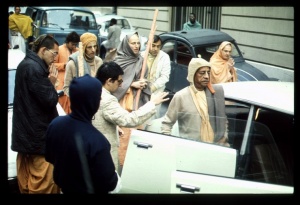SB 7.2.46: Difference between revisions
No edit summary |
(Vanibot #0054 edit - transform synonyms into clickable links, which search similar occurrences) |
||
| Line 23: | Line 23: | ||
<div class="synonyms"> | <div class="synonyms"> | ||
''bhūta'' | ''[//vanipedia.org/wiki/Special:VaniSearch?s=bhūta&tab=syno_o&ds=1 bhūta]'' — by the five material elements; ''[//vanipedia.org/wiki/Special:VaniSearch?s=indriya&tab=syno_o&ds=1 indriya]'' — the ten senses; ''[//vanipedia.org/wiki/Special:VaniSearch?s=manaḥ&tab=syno_o&ds=1 manaḥ]'' — and the mind; ''[//vanipedia.org/wiki/Special:VaniSearch?s=liṅgān&tab=syno_o&ds=1 liṅgān]'' — characterized; ''[//vanipedia.org/wiki/Special:VaniSearch?s=dehān&tab=syno_o&ds=1 dehān]'' — gross material bodies; ''[//vanipedia.org/wiki/Special:VaniSearch?s=ucca&tab=syno_o&ds=1 ucca]-[//vanipedia.org/wiki/Special:VaniSearch?s=avacān&tab=syno_o&ds=1 avacān]'' — high class and low class; ''[//vanipedia.org/wiki/Special:VaniSearch?s=vibhuḥ&tab=syno_o&ds=1 vibhuḥ]'' — the individual soul, which is the lord of the body and senses; ''[//vanipedia.org/wiki/Special:VaniSearch?s=bhajati&tab=syno_o&ds=1 bhajati]'' — achieves; ''[//vanipedia.org/wiki/Special:VaniSearch?s=utsṛjati&tab=syno_o&ds=1 utsṛjati]'' — gives up; ''[//vanipedia.org/wiki/Special:VaniSearch?s=hi&tab=syno_o&ds=1 hi]'' — indeed; ''[//vanipedia.org/wiki/Special:VaniSearch?s=anyaḥ&tab=syno_o&ds=1 anyaḥ]'' — being different; ''[//vanipedia.org/wiki/Special:VaniSearch?s=tat&tab=syno_o&ds=1 tat]'' — that; ''[//vanipedia.org/wiki/Special:VaniSearch?s=ca&tab=syno_o&ds=1 ca]'' — also; ''[//vanipedia.org/wiki/Special:VaniSearch?s=api&tab=syno_o&ds=1 api]'' — indeed; ''[//vanipedia.org/wiki/Special:VaniSearch?s=svena&tab=syno_o&ds=1 svena]'' — by his own; ''[//vanipedia.org/wiki/Special:VaniSearch?s=tejasā&tab=syno_o&ds=1 tejasā]'' — power of advanced knowledge. | ||
</div> | </div> | ||
Latest revision as of 22:59, 18 February 2024

A.C. Bhaktivedanta Swami Prabhupada
TEXT 46
- bhūtendriya-mano-liṅgān
- dehān uccāvacān vibhuḥ
- bhajaty utsṛjati hy anyas
- tac cāpi svena tejasā
SYNONYMS
bhūta — by the five material elements; indriya — the ten senses; manaḥ — and the mind; liṅgān — characterized; dehān — gross material bodies; ucca-avacān — high class and low class; vibhuḥ — the individual soul, which is the lord of the body and senses; bhajati — achieves; utsṛjati — gives up; hi — indeed; anyaḥ — being different; tat — that; ca — also; api — indeed; svena — by his own; tejasā — power of advanced knowledge.
TRANSLATION
The five material elements, the ten senses and the mind all combine to form the various parts of the gross and subtle bodies. The living entity comes in contact with his material bodies, whether high or low, and later gives them up by his personal prowess. This strength can be perceived in a living entity's personal power to possess different types of bodies.
PURPORT
The conditioned soul has knowledge, and if he wants to fully utilize the gross and subtle bodies for his real advancement in life, he can do so. It is therefore said here that by his high intelligence (svena tejasā), by the superior power of superior knowledge achieved from the right source—the spiritual master, or ācārya—he can give up his conditional life in a material body and return home, back to Godhead. However, if he wants to keep himself in the darkness of this material world, he can do so. The Lord confirms this as follows in Bhagavad-gītā (BG 9.25):
- yānti deva-vratā devān
- pitṟn yānti pitṛ-vratāḥ
- bhūtāni yānti bhūtejyā
- yānti mad-yājino 'pi mām
"Those who worship the demigods will take birth among the demigods; those who worship ghosts and spirits will take birth among such beings; those who worship ancestors go to the ancestors; and those who worship Me will live with Me."
The human form of body is valuable. One can use this body to go to the higher planetary systems, to Pitṛloka, or he can remain in this lower planetary system, but if one tries he can also return home, back to Godhead. This prowess is given by the Supreme Personality of Godhead as the Supersoul. Therefore the Lord says, mattaḥ smṛtir jñānam apohanaṁ ca: (BG 15.15) "From Me come remembrance, knowledge and forgetfulness." If one wants to receive real knowledge from the Supreme Personality of Godhead, one can become free from bondage to repeated acceptance of material bodies. If one takes to the devotional service of the Lord and surrenders unto Him, the Lord is prepared to give one directions by which to return home, back to Godhead, but if one foolishly wants to keep himself in darkness, he can continue in a life of material existence.